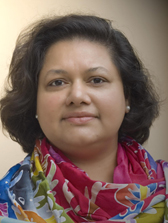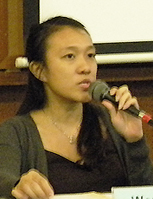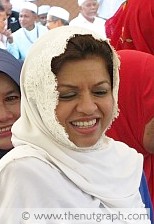
TO its credit, the government is trying to introduce sex education in schools. From mid-2009 till end of 2011, the Women, Family and Community Development Ministry and the Education Ministry are implementing a pilot project targeting 16- and 17-year-olds in five schools.
“The ministry hopes to use the outcome from the project to advocate for the inclusion of social and reproductive health education in primary and secondary schools,” Women, Family and Community Development Minister Datuk Seri Shahrizat Abdul Jalil tells The Nut Graph. Indeed, with increased reports of baby dumping and teenage pregnancies, having sex education is clearly an imperative.
The pilot project is called I’m In Control, and Shahrizat explains that the module educates teenagers on how to identify and avoid high-risk situations, including assertive techniques to avoid premarital sex.
If the government is eventually successful in implementing sex education in schools, how should a comprehensive sex education look like? Additionally, what obstacles stand in the way of sex education?
Sexual beings
P.S. The Children‘s training and education director Nooreen Preusser says that everyone, regardless of their age, is a sexual being. “Even babies are curious about their bodies and play with their genitals; it’s a healthy curiosity,” she says in a phone interview with The Nut Graph.
Hence, she argues, sex and sexuality education should begin from pre-school, in an age-appropriate way.

“We could start by teaching children the correct names of their private body parts as we teach them the names of their other body parts,” she says, adding that that this signals there is no shame or mystery associated with private body parts.
Preusser says that in Germany, eight- and nine-year-olds are taught the basic facts about heterosexual sex and conception.
“The children are not shocked as it is done in an appropriate and matter-of-fact way,” she says, stressing that children also need to be taught to differentiate between a safe and unsafe touch.
Preusser adds that in countries like Finland and Netherlands, where sex education starts at pre-school, the rates of unplanned teenage pregnancies and teenagers infected with sexually transmitted infections (STIs) are much lower.
Access to information
Malaysian youths are also not helped by their alarmingly low awareness about contraception, according to a survey released in 2009. Additionally, contraception is not offered by the public health sector to unmarried people, Low Wah Yun from Universiti Malaya‘s Faculty of Medicine points out in a 2009 research paper.
Youths only have access to contraceptive services by private and non-governmental organisations. However, low awareness on the availability of such services and social stigma prevent most youth from accessing these services.

“Teenagers have the right to accurate sexual and reproductive health information so that they can make responsible and informed sexual choices,” says Wong Li Leng from the Federation of Reproductive Health Associations Malaysia (FRHAM).
She says her association promotes abstinence, but “we have to accept the reality that some teenagers are engaging in premarital sex, and they need to have information to protect themselves and their partners from HIV/AIDS, STIs, unplanned pregnancies, etc.”
Teaching equality
Activist and writer Marina Mahathir says gender is a key component that should be included in sex education.
“We have to educate teenagers about negative gender stereotypes; for example, how boys are expected to be macho all the time and girls are expected to be submissive in relationships under social norms,” the 3R executive producer says. The TV programme 3R tackles issues on sexuality and women’s rights.
Wong agrees with Marina: “[W]ithout knowing the assumptions made to boys and girls, and recognising how gender stereotyping affects their choices and relationships in their lives, teenagers will not be able to apply the skills [in negotiating sexual relationships] in their daily lives.”
Wong adds that in FRHAM’s module, they also educate adolescents on their rights and values, and what to do when their rights are violated. “[F]or example, if they are sexually harassed or abused, we educate them on why it happens, what to do, and where to go.”

“We [also] explore issues on peer pressure, and the techniques of saying ‘no’,” Wong tells The Nut Graph.
Marina adds that topics such as dating, commitment in a relationship, as well as the existence of different sexualities should also be discussed in sex education.
In Singapore, sex education starts from upper primary till pre-university level. However, homosexuality is only covered in one lesson in lower secondary school, and students are taught that homosexual acts are illegal. People with other sexualities such as transgender, asexual and intersex are not mentioned in the curriculum at all.
“We can’t pretend that people with different sexualities don’t exist. It only serves to elevate discrimination against them. We need to create more safe spaces for people to talk about these issues,” says Marina.
Wong says FRHAM does provide information on other sexualities in their module.
Political will
If Malaysian youth are to be empowered to make informed and responsible choices on their sexual and reproductive health behaviour, then having comprehensive sex education would help. However, the government’s attempt to introduce sex education, also known as social and reproductive health education or sexuality education, in schools is not new.
In 2005, the Education Ministry announced it planned to introduce sex education to curb sexual crimes, internet pornography, and premarital sex. The government also considered including sex education in the National Service programme in 2008. There have not been any updates on either initiative.

Shahrizat says many parents worry because they misconceive sex education as teaching young people how to have sex, while teachers say they are not prepared to take on the subject.
“[P]arents worry [this] will lead to early sexual experimentation and promiscuity.
“However, findings of studies carried out by countries that have implemented sex education such as Sweden, Norway and Netherlands have shown that sex education for young people leads to a delay in sexual initiation, promotes abstinence, and prevents STIs and unwanted pregnancies,” Shahrizat says. ![]()
The Nut Graph needs your support


Sean says
I was ready to applaud the government until I read ’16 to 17 year olds’. Do you have a saying here about horses and stable doors? I had a sex-free upbringing – my parents would quickly change channel on the TV if a man and woman appeared even to look sideways at each other. I went to single-sex schools where sex education was a 15-minute animated line-drawing movie shown to us at 15. My father asked me “Is there anything you er want to know about um, sex?” on my 20th birthday, after I had already had at least one near-disastrous encounter with the subject away from home which had led me to receive a great deal of information about the subject from the GUM clinic at the local Hospital.
I think it’s imperative – moreso for parents than it is for schools – to face up to the issue rather than try to pretend it doesn’t exist. My daughter seems only to have learned “Ee-er shame-shame!” from school so far, and I have a sneaking suspicion that my kids are the only ones who refer to their primary sexual characteristics as “vagina” and “penis”. OK, I have to confess a half-past-six attempt: my daughter was originally struggling with 3 syllables, so she more frequently says “fanny”, which has some UK/US English issues…
My wife does exactly worry that the “private part” labels I use with our kids will make them promiscuous, but I think we’ve managed to compromise on the idea that it would be better to know and have some ability to discuss the issue later on, than it would to suspect or worry and have no shared language with which we can comfortably discuss the issue with our kids when they are teenagers. When my daughter tells me about Faizal putting his timun in her sandwich, I want to know whether we’re discussing nutrition or not.
I think it’s harder for parents here to broach the topic of sex with their children because the environment is so superficially sex-free (except for the mangy, sore-covered dogs who seem to be making up for everyone else’s coyness over where babies come from). I think basic personal, physical awareness for children is certainly a parent’s responsibility. I wouldn’t ever seek a Reading, Riting and Rinkly-bits education for my kids. At the same time, I would expect an education system to ensure some evenness in children’s knowledge (if not understanding) of the topic.
I have sympathy for the teacher who might resist the obligation to teach children about human sex (as opposed to biological reproduction), purely on the basis that I think human sexuality is not an extensive-enough subject in itself to warrant the kind of attention from the educator that would satisfy them that they were ‘doing it right’. A friend in the UK is a Youth Development worker, and teaches children of all ages about sex more or less full-time. They’re not based in schools, but in an educational or welfare district and organises regular visits and workshops at schools at which they do classroom teaching about sex and offers ‘an ear’ on a one-on-one basis for any pupil that wants it. Could this be a workable alternative for Malaysia?
Talib says
Sounds like a practical approach, against a backdrop of delepleting resources and low income!
There are a couple of things that nag many. WHAT IS the real situation about this SEX thing in society and in schools?
Then there’s the general opacity in Malaysia – things that would have helped have been controverted and suppressed.
Look at the reach of TV and Radio? Our housewives are watching Korean Soap operas for want of something different and better. Surely, there are things that might interest them, in addition to those? And the hopeless manner social media is being abused by government.
Is the problem of rising infanticide the impetus wrongly attributed to the sex problem?
Has there been apparent signs of misconceived religious zeal under the guise of social correctness?
Many questions need to be asked and answered in this Malaysian backdrop. It really is not a cough drop!
farha says
Hi there, I agree, I think the sex education topic is being brought up in the light of the growing social problems/trends like teenage pregnancy, promiscuity/sex out of wedlock, abandoning of babies, the ease of watching/downloading porno materials from the internet, and even the insertion of things bordering on sexuality in movies, video clips, songs, & children’s programmes (yes!).
I was a teacher about 15yrs ago. Sex education is incorporated into subjects like science, biology, Islamic knowledge and physical & health education. So now that I think about it, yes, there’s enough on sex in the syllabus to ensure that our young people have basic knowledge. What may be inadequate is:
1) the human ingredient i.e the teacher. if the teacher has reservations/’shy’ (I have seen many) in teaching this module, it can mislead students
2) there’s no mention of contraceptives (that’s why when it happens, I think most of them resort to abortion ) and ‘the others’ (LGBT), so it’s hard to discuss at a wider angle.
Talib says
I agree intimacy is not easy to approach and teachers must be carefully selected and trained if need be. At the end of the day what we need is simply level headed people.
On the subject of politicising everything read what Shahrizat wants done:
Would this make women voters elect her instead of improving things? Elections are coming!
Talib says
Ali Rustam’s foray into religious rules on marriage for underaged Muslim girls now just encourages sex tourism. In some countries in Middle East women are married for a short period and then divorced. This would be a horrendous blight on our Malaysian Muslim community.
All these now are grave results of our political instability.
Talib says
Let’s start somewhere.
Would this be the cultural derivation, now outmoded, among Malays that it’s the girls who are to blame? 😉
Wonder how understanding the biological imperatives will help teachers subliminate raging testosterone to meaningful physical and intellectual development? Surely people with a passionate disposition have higher sexuality?
Dr Syed Alwi says
Dear TNG,
I support sex education as a topic to be discussed under moral/religious education. You cannot separate the issue from values.
Yeo Kien Kiong says
Dear Dr Syed Alwi,
I believed that sex education is not only a topic to be discussed under moral/religious education, but also as a holistic course of understanding life and death.
Without life, there is no sex.
Adam says
Yeo,
It should be “without sex, there is no life”, right? More food for thought.
Sean says
My nit-picking nerve twitched (hey a ‘not this implies not this’ statement!) when I saw that too, but it’s correct. There are plenty of living things that reproduce without sex.
http://en.wikipedia.org/wiki/Asexual_reproduction
At worst it’s not a very interesting observation: without life, there’s not much of anything interesting at all!
Talib says
What could pop up in some people’s mind could be “no sex” required at all as we can now do cloning or whatever scientifically. They might just come up with a tablet or pill to pop when they need “sex” to get similar “kicks” – just that “kicks” !
It sounds like a nutty world or dimension but if that’s what they want by all means they can do it for themselves. By the same token others should be allowed to articulate “natural” ways of living in some kind of symbiosis.
Sean says
Wah sometimes a simple comment just has me distracted for days. Perhaps – rather than discrete (separate) sex education or moral indoctrination – sex education could be taught as part of something more holistic as Yeo suggests. A book that had a huge impact on me was Sherwin B. Nuland’s “How we die” – his answer to his observation as a surgeon that the manner of death of a loved one is rarely what is expected by those left behind.
It seems wrong (I think I recall Nuland saying something similar in the book’s introduction) that we should learn foreign geography, foreign languages, distant times, the science of things invisible to the unassisted eye, but yet we should remain a mystery to ourselves. Would education in “Human Studies” be too much like navel-gazing? I think there’s enough relevant material to construct a whole syllabus – something that’s not true of the mechanics of sex, for example. I think a holistic course could take in the mechanics of birth; baby and child care; the acquisition of knowledge (mimicry, rote-learning, experimentation); role-models(?); creativity, imagination, fantasy and pathologies of mind; human relations (sex goes here?), personal and groups; society, traditions and laws; working, professional and charitable life; ageing and death.
Perhaps I’m showing my ignorance and such a course already exists?
azlan says
What do you mean teach sex in moral/religious class? You can’t even get teachers to teach it in health class, and you want uztazah, uztaz and moral teachers to do it. What are you talking about? Sex is not about religion. It is more to do about responsibility than god.
Bad Rabbit says
In England at my school we had S.H.E. – Sex & Health Education lessons. I remember when we got told that the lesson ahead was going to be all about sex and as hormonally driven 15 year olds, jokes were dusted off and polished; plans were laid to ask the most difficult and embarassing questions of the teacher and the whole class developed a leering expectation.
When we showed up for the class, the teacher involved was a woman.
She gave us a very frank talk about sex, the sexual performance of men from a womans perspective, the difference between sex and relationships and why teenage boys were just so immature about sex.
All those dusted off jokes and not one got told.
All those questions unasked.
All the leering quieted.
All the hubris converted into a little humility.
Women teachers talking frankly and honestly to overheated teen boys about sex?
Best birth control since the bucket of iced water.
DeePo says
I’m waiting for a ”fatwa” from the mufti…hahahahahaha.
I wonder what will these ”muftis” will think about the so-called sex-ed.
Adam says
DeePo,
I thought our dear Nik Aziz already said no no to sex education? He reckoned it to teaching thieves how to steal. Well, such a simple minded and likeable chap; a bit outdated in his thinking though…
mike says
Pretty comprehensive, free, and relevant … wonder if M’sia has her own version of this:
http://sexreally.com/
Otherwise, it should be used for reasons given above.
born2reign says
My parents warned/educated us about dirty old men, flashers, abducters, drugs (white stuff), ghosts, all except sex. Sex should be taught by a responsible adult who understands that it is part of a committed relationship, and not a reproductive act.
I teach my kids from 3 to 8 yrs about conception, sperms and eggs, vagina, cervix and penis, from a pictorial pregnancy book. They were very interested, of course they cannot understand the relationship part of it (the difference between friendship and lovers). So we welcome questions from there and they are not told it is a dirty taboo subject.
The important factor is whether there are any teachers who are capable and mature enough to teach about love, relationship, commitment, sacrifice and long-suffering BEFORE teaching about sexual intercourse. Otherwise, just distribute condoms and pills and VCDs about sexual intercourse – who needs a face?
Talib says
“…who needs a face?…”
Not Shahrizat’s!
Malaysians need a face. Maybe a body is good enough … a non profit body of tinkerers who do consultancy and let it pay itself.
Plenty of retired medical people around. Then there’s plenty of young ones, too. A Malaysian doctor no longer serves 7,500 citizens. It’s down to almost under 1,000 citizens to 1 doctor now!???
Sell educational information to the community. Can even sell well researched information to WHO or other less developed countries. Help others and help ourselves. The HIV problem is a huge one, too!
But someone’s got to paint the overall contemporary picture and scope of the problem and the work. […]
The state we’re in, Najib will put another RM5 billion on PM’s Dept budget which is already RM12 billion.